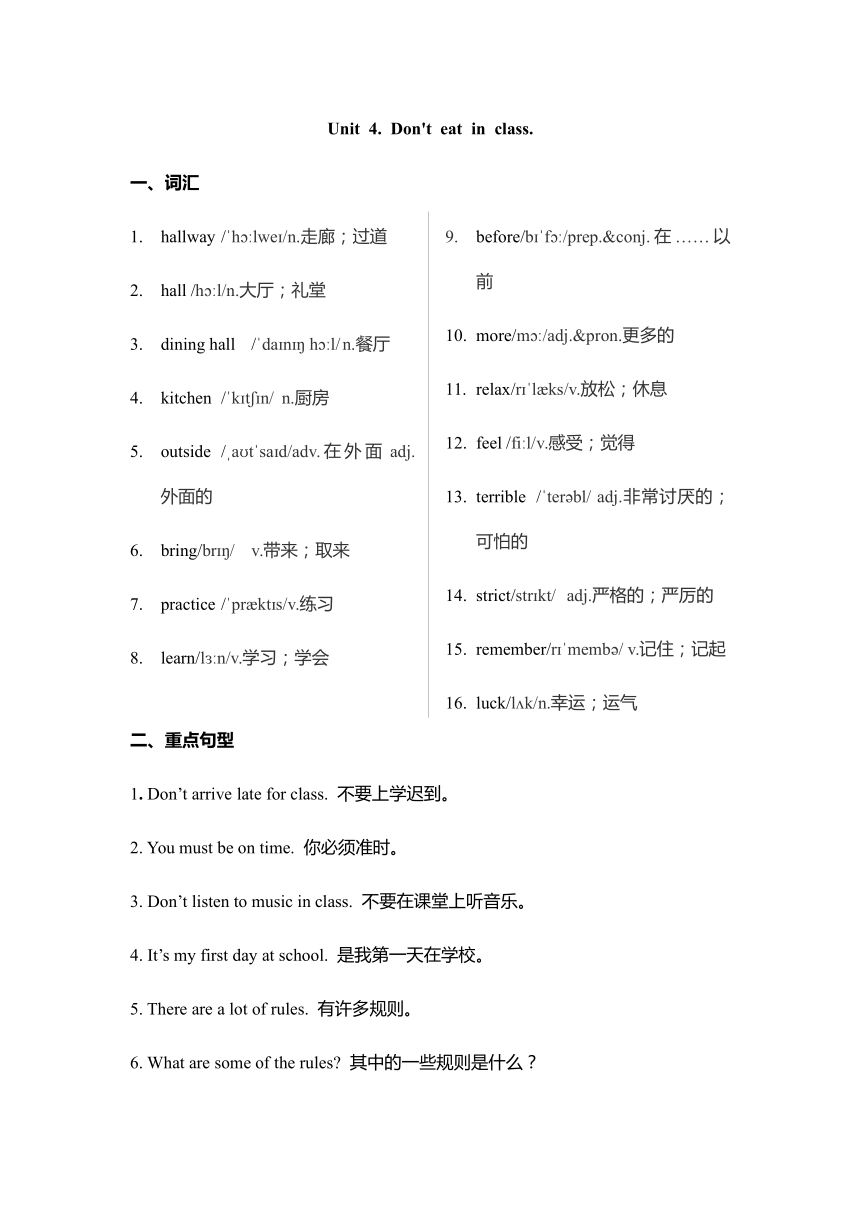
Unit 4. Don't eat in class. 词汇 hallway / h lwe /n.走廊;过道 hall /h l/n.大厅;礼堂 dining hall / da n h l/ n.餐厅 kitchen / k t n/ n.厨房 outside / a t sa d/adv.在外面adj.外面的 bring/br / v.带来;取来 practice / pr kt s/v.练习 learn/l n/v.学习;学会 before/b f /prep.&conj.在……以前 more/m /adj.&pron.更多的 relax/r l ks/v.放松;休息 feel /fi l/ v.感受;觉得 terrible / ter bl/ adj.非常讨厌的;可怕的 strict/str kt/ adj.严格的;严厉的 remember/r memb / v.记住;记起 luck /l k/n.幸运;运气 二、重点句型 1. Don’t arrive late for class. 不要上学迟到。 2. You must be on time. 你必须准时。 3. Don’t listen to music in class. 不要在课堂上听音乐。 4. It’s my first day at school. 是我第一天在学校。 5. There are a lot of rules. 有许多规则。 6. What are some of the rules 其中的一些规则是什么? 7. Can we bring music players to school 我们能带音乐播放器到学校吗? 8. What do you have to do 你不得不做什么? 9. There are too many rules. 有太多规则了。 10. At school, we have more rules. 在学校里,我们有更多规则。 三、考点单词汇总 rule too many, too much Noisy strict remember practice 7.help 8.make bring realx feel luck 13.have fun 四、语法 祈使句 1. 定义 用来表示请求、命令、建议、号召、警告等的句子。说话的对象大多为第二人称you,且常被省略。句末用感叹号或句号,读时用降调。为了表示客气,常用please一词。放在句首时,其后不加逗号;放在句末时,其前通常加逗号。 2. 构成:祈使句分为肯定祈使句和否定祈使句。 (1) 肯定祈使句的构成: ① Do型,即以行为动词原形开头。 ② Be型,即以动词be开头。 ③ Let型,即以let开头。 (2) 否定祈使句的构成: ① Do型和Be型的否定式,在动词前加don’t或never,即“Don’t do/be sth.”或者“Never do/be sth.”。 ② Let型的有两种否定形式:在let前加don’t,即“Don’t let sb. do sth.”或在let sb.后加not,即“Let sb. not do sth.”。 ③其他类型:“No +v.-ing形式/名词”,用于警示人们不要做某事。 3. 答语 祈使句的动作通常是将来发生的动作,所以回答祈使句时,一般用will或won’t。 4. 其他用法: 祈使句和陈述句的连用 (1)祈使句+ and/ then + 陈述句,二者之间表示一种顺承关系。 (2)祈使句+ or +陈述句,二者之间表示一种否定条件。 练习 一、单项选择 1. I often go to bed late because I have homework to do every day. A. too many B. too much C. many too D. much too 2. —Let’s go out to play. —Sorry, I must the piano now. A. make B. practice C. listen D. exercise 3. The teacher is very strict his students. A. with B. in C. for D. to 4. — arrive late for class, Mike. —I won’t, Mom. A. Can’t B. Doesn’t C. Don’t D. Do 5. Don’t listen to music in the classrooms the hallways. A. and B. or C. yet D. but 6.. -I can’t stop smoking(吸烟), doctor. -For your health, I’m afraid you _____. A. must B. can C. may D. can’t 7. -Don’t eat in class, Bill. -_____. A. Yes, I do B. No, I don’t C. Sorry, I don’t D. Yes, I will 8. There are _____ people in the hall and there are _____ noise(噪音) in it. A. too many; too much B. too many; much too C. too much; too many D. too much; much too 9. Don’t your schoolbag at school. A. leave B. take C. bring D. get 10.Tom practices the piano f ... ...
~~ 您好,已阅读到文档的结尾了 ~~

